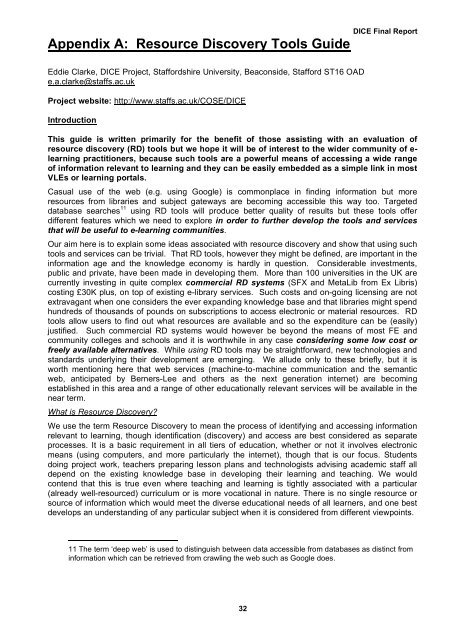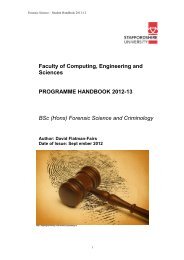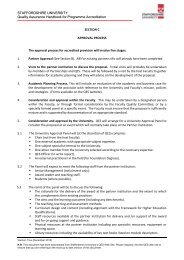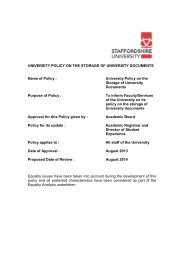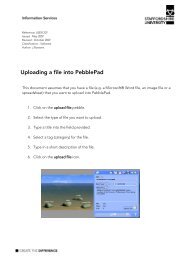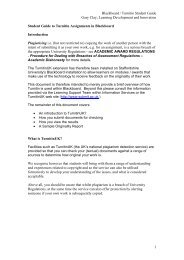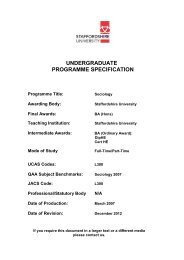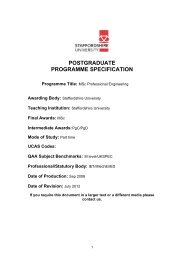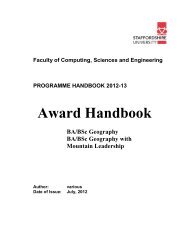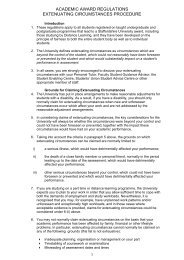DICE Project Final Report Resource Discovery Tools Evaluation and ...
DICE Project Final Report Resource Discovery Tools Evaluation and ...
DICE Project Final Report Resource Discovery Tools Evaluation and ...
You also want an ePaper? Increase the reach of your titles
YUMPU automatically turns print PDFs into web optimized ePapers that Google loves.
Appendix A: <strong>Resource</strong> <strong>Discovery</strong> <strong>Tools</strong> Guide<br />
<strong>DICE</strong> <strong>Final</strong> <strong>Report</strong><br />
Eddie Clarke, <strong>DICE</strong> <strong>Project</strong>, Staffordshire University, Beaconside, Stafford ST16 OAD<br />
e.a.clarke@staffs.ac.uk<br />
<strong>Project</strong> website: http://www.staffs.ac.uk/COSE/<strong>DICE</strong><br />
Introduction<br />
This guide is written primarily for the benefit of those assisting with an evaluation of<br />
resource discovery (RD) tools but we hope it will be of interest to the wider community of e-<br />
learning practitioners, because such tools are a powerful means of accessing a wide range<br />
of information relevant to learning <strong>and</strong> they can be easily embedded as a simple link in most<br />
VLEs or learning portals.<br />
Casual use of the web (e.g. using Google) is commonplace in finding information but more<br />
resources from libraries <strong>and</strong> subject gateways are becoming accessible this way too. Targeted<br />
database searches 11 using RD tools will produce better quality of results but these tools offer<br />
different features which we need to explore in order to further develop the tools <strong>and</strong> services<br />
that will be useful to e-learning communities.<br />
Our aim here is to explain some ideas associated with resource discovery <strong>and</strong> show that using such<br />
tools <strong>and</strong> services can be trivial. That RD tools, however they might be defined, are important in the<br />
information age <strong>and</strong> the knowledge economy is hardly in question. Considerable investments,<br />
public <strong>and</strong> private, have been made in developing them. More than 100 universities in the UK are<br />
currently investing in quite complex commercial RD systems (SFX <strong>and</strong> MetaLib from Ex Libris)<br />
costing £30K plus, on top of existing e-library services. Such costs <strong>and</strong> on-going licensing are not<br />
extravagant when one considers the ever exp<strong>and</strong>ing knowledge base <strong>and</strong> that libraries might spend<br />
hundreds of thous<strong>and</strong>s of pounds on subscriptions to access electronic or material resources. RD<br />
tools allow users to find out what resources are available <strong>and</strong> so the expenditure can be (easily)<br />
justified. Such commercial RD systems would however be beyond the means of most FE <strong>and</strong><br />
community colleges <strong>and</strong> schools <strong>and</strong> it is worthwhile in any case considering some low cost or<br />
freely available alternatives. While using RD tools may be straightforward, new technologies <strong>and</strong><br />
st<strong>and</strong>ards underlying their development are emerging. We allude only to these briefly, but it is<br />
worth mentioning here that web services (machine-to-machine communication <strong>and</strong> the semantic<br />
web, anticipated by Berners-Lee <strong>and</strong> others as the next generation internet) are becoming<br />
established in this area <strong>and</strong> a range of other educationally relevant services will be available in the<br />
near term.<br />
What is <strong>Resource</strong> <strong>Discovery</strong>?<br />
We use the term <strong>Resource</strong> <strong>Discovery</strong> to mean the process of identifying <strong>and</strong> accessing information<br />
relevant to learning, though identification (discovery) <strong>and</strong> access are best considered as separate<br />
processes. It is a basic requirement in all tiers of education, whether or not it involves electronic<br />
means (using computers, <strong>and</strong> more particularly the internet), though that is our focus. Students<br />
doing project work, teachers preparing lesson plans <strong>and</strong> technologists advising academic staff all<br />
depend on the existing knowledge base in developing their learning <strong>and</strong> teaching. We would<br />
contend that this is true even where teaching <strong>and</strong> learning is tightly associated with a particular<br />
(already well-resourced) curriculum or is more vocational in nature. There is no single resource or<br />
source of information which would meet the diverse educational needs of all learners, <strong>and</strong> one best<br />
develops an underst<strong>and</strong>ing of any particular subject when it is considered from different viewpoints.<br />
11 The term ‘deep web’ is used to distinguish between data accessible from databases as distinct from<br />
information which can be retrieved from crawling the web such as Google does.<br />
32


